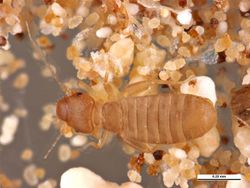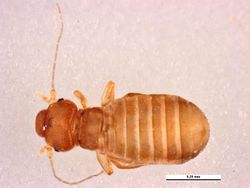Difference between revisions of "Liposcelis bostrychophila"
From Pestinfo-Wiki
| Line 1: | Line 1: | ||
| − | {{ | + | {{TaxLinks|LnkLiposcelis}} |
{{LiteratureDB|{{PAGENAME}}|browse,products,benefialsN}} | {{LiteratureDB|{{PAGENAME}}|browse,products,benefialsN}} | ||
[[File:Liposcelis_bostrychophila_PaDIL136567a.jpg|250px|thumb|''Liposcelis bostrychophila'' live adult (click on image to enlarge it)<br/>Author(s): Ken Walker Museum Victoria<br/>Source: [http://www.padil.gov.au/pests-and-diseases/Pest/Main/136567 PaDIL]]] | [[File:Liposcelis_bostrychophila_PaDIL136567a.jpg|250px|thumb|''Liposcelis bostrychophila'' live adult (click on image to enlarge it)<br/>Author(s): Ken Walker Museum Victoria<br/>Source: [http://www.padil.gov.au/pests-and-diseases/Pest/Main/136567 PaDIL]]] | ||
| − | <font color="#800000">'''''Liposcelis bostrychophila'''''</font> Badonnel, 1931 | + | <font color="#800000">'''''Liposcelis bostrychophila'''''</font> Badonnel, 1931 |
| − | is a wide-spread stored-product and hygenical pest which is common in houses and stores. It is apparently of tropical origin but is now common in temperate regions and has become an important pest in Asia, Europe, North America and Australia. Although it can contaminate all kinds of organic products (including insect collections), the main impact is on grain stores where it reaches extremely high numbers. | + | |
| + | The species is a wide-spread stored-product and hygenical pest which is common in houses and stores. It is apparently of tropical origin but is now common in temperate regions and has become an important pest in Asia, Europe, North America and Australia. Although it can contaminate all kinds of organic products (including insect collections), the main impact is on grain stores where it reaches extremely high numbers. | ||
[[File:Liposcelis_bostrychophila_PaDIL136567b.jpg|250px|thumb|left|''Liposcelis bostrychophila'' adult (click on image to enlarge it)<br/>Author(s): Ken Walker Museum Victoria<br/>Source: [http://www.padil.gov.au/pests-and-diseases/Pest/Main/136567 PaDIL]]] | [[File:Liposcelis_bostrychophila_PaDIL136567b.jpg|250px|thumb|left|''Liposcelis bostrychophila'' adult (click on image to enlarge it)<br/>Author(s): Ken Walker Museum Victoria<br/>Source: [http://www.padil.gov.au/pests-and-diseases/Pest/Main/136567 PaDIL]]] | ||
The adults are wingless, brownish and about 1 mm long. They can reproduce parthenogenically which explains its invasion potential and rapid multiplication. The development from egg to adult lasts 18d at 32°C ([[Annals of the Entomological Society of America (2000) 93, 261-270|Wang et al., 2000]]). It can also survive without food for around 2 months. | The adults are wingless, brownish and about 1 mm long. They can reproduce parthenogenically which explains its invasion potential and rapid multiplication. The development from egg to adult lasts 18d at 32°C ([[Annals of the Entomological Society of America (2000) 93, 261-270|Wang et al., 2000]]). It can also survive without food for around 2 months. | ||
[[Category:Liposcelis (genus - booklice/storage pests)]] | [[Category:Liposcelis (genus - booklice/storage pests)]] | ||
Latest revision as of 18:08, 11 May 2015
| Literature database |
|---|
| 68 articles sorted by: |
| • year (recent ones first) |
| • research topics |
| • countries/regions |
| • products infested |
| • list of natural enemies |

Liposcelis bostrychophila live adult (click on image to enlarge it)
Author(s): Ken Walker Museum Victoria
Source: PaDIL
Author(s): Ken Walker Museum Victoria
Source: PaDIL
Liposcelis bostrychophila Badonnel, 1931
The species is a wide-spread stored-product and hygenical pest which is common in houses and stores. It is apparently of tropical origin but is now common in temperate regions and has become an important pest in Asia, Europe, North America and Australia. Although it can contaminate all kinds of organic products (including insect collections), the main impact is on grain stores where it reaches extremely high numbers.

Liposcelis bostrychophila adult (click on image to enlarge it)
Author(s): Ken Walker Museum Victoria
Source: PaDIL
Author(s): Ken Walker Museum Victoria
Source: PaDIL
The adults are wingless, brownish and about 1 mm long. They can reproduce parthenogenically which explains its invasion potential and rapid multiplication. The development from egg to adult lasts 18d at 32°C (Wang et al., 2000). It can also survive without food for around 2 months.